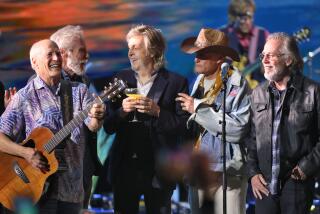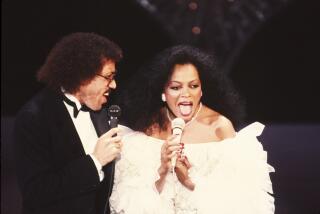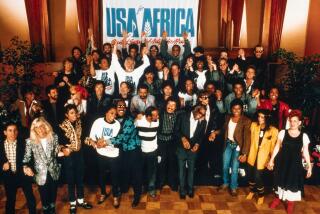‘All You Need Is Love’ finally arrives in U.S.
British documentary maker Tony Palmer called his 17-hour TV series exploring the origins of American popular music “All You Need Is Love,” because John Lennon told him it would make a great title. But in the three decades since he made it, it’s become evident to Palmer that he could justifiably have named it “Nick of Time.”
The series will be shown in its entirety for the first time in the U.S. this weekend, marathon style, at the Egyptian Theatre in Hollywood as part of the Mods & Rockers Film Festival. It’s broken down into chapters on various facets of popular music, such as jazz, blues, swing, Tin Pan Alley, country, the Beatles and music that was fresh when Palmer was filming it in 1975 and 1976, glitter and progressive rock.
“For the swing episode, I just made a list: Who would be great to get? Bing Crosby, Frank Sinatra, Benny Goodman, Cab Calloway,” Palmer said from Las Vegas earlier this week while attending a Beatles fan festival. “Then it just became a matter of tracking them down. It became like a military campaign.
“But what I couldn’t possibly have known then is that within a very short period of time many of these people would be dead,” he said. “So these were the last and most substantial interviews a lot of these artists gave.”
The list of Palmer’s interviewees is remarkable. Naturally, there is an episode on the Beatles featuring interviews with members of the Fab Four as well as another highlighting such key ‘60s rock figures as the Rolling Stones, Pink Floyd, Frank Zappa and the Who.
But the greatest treasure might be his footage of figures who were tremendously influential but far less celebrated: Hoagy Carmichael, E.Y. “Yip” Harburg, Eubie Blake, Muddy Waters, Tina Turner, Buddy Rich, Ernest Tubb, Bo Diddley. Palmer also used rare film performances or interviews with George Gershwin, Irving Berlin, Al Jolson, Hank Williams, Woody Guthrie, Charlie Parker and dozens more.
Those were the un- or under-sung musical heroes Lennon urged Palmer to document -- “He told me I should make it my mission,” Palmer recalls -- when the two randomly bumped into each other one day in New York in 1974. Palmer had previously made “All My Loving,” a film about the ‘60s rock scene in England that Lennon and Paul McCartney had admired.
“Take the stuff with Muddy Waters,” he said. “Of course I knew who he was, not the least because Mick Jagger never stopped talking about him -- probably out of guilt. But I just couldn’t find him. Then we were in Chicago filming something else and in the Tribune I saw a little ad for a gig with Muddy Waters, and eventually I spoke to him on the phone.
“He said, ‘Sure, come on down.’ So we went down to this pokey little club on the west side. . . . I thought we must have gotten there on the wrong night, because nobody was there. It would be wrong to say there were more people in our crew than were there in the club, but it sure felt that way.
“At that time, a lot of those people had been, if not forgotten, overlooked, and their careers were in the doldrums,” he said. “When I went to interview Jerry Lee Lewis in Las Vegas, he was performing not on a stage or even on a riser, but in the entrance to the Holiday Inn. He was on one side of the room and people were checking in on the other.”
Because he found so many influential musicians who had been taken for granted at home, Palmer was “disappointed but not surprised” that “All You Need Is Love” has aired in England, Germany, Australia, Hong Kong and Canada but never from beginning to end in the U.S.
Revisiting the series 30-plus years later while supervising the remastering for the DVD, Palmer said there were things he’d change if he could. For one, he’d originally wanted to add an 18th hour as punk rock was starting to explode in England. But his financiers thought 17 hours was plenty, he said, “and the money men didn’t really understand punk anyway.”
“The basic thing we got right, what emerged as a theme, is something that kept occurring in whatever aspect of music we were looking at: It began as a simple expression with someone strumming a guitar or twanging a bow, to express what people were feeling about the circumstances in which they live. Then they discover ‘Gosh, there’s an audience for this; people want it.’ That brings in the businessmen, who realize there is money to be made, and soon the original expression has been totally emasculated. And it happened over and over and over again.”
Since “All You Need Is Love” came out on DVD in May, he said, “the most interesting reaction in the U.S. is that in the reviews, 1 in 3, and that’s not an exaggeration, say that this really should be distributed to all high schools as a primer in the origins of our music. That’s enormously flattering and makes me think maybe we didn’t do such a bad job after all.”
More to Read
The biggest entertainment stories
Get our big stories about Hollywood, film, television, music, arts, culture and more right in your inbox as soon as they publish.
You may occasionally receive promotional content from the Los Angeles Times.






